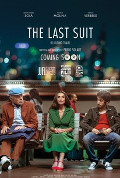
Argentina/Spain 2017
Directed by
Pablo Solarz
86 minutes
Rated M
Reviewed by
Bernard Hemingway

Last Suit, The
Synopsis: Abraham Bursztein (Miguel Ángel Solá), a Polish-born Holocaust survivor living in Buenos Aires is at the end of his days. He has health problems and his adult children have sold the family home where he has lived for the past 50 years and are about to put him in a retirement home. On the spur of the moment he decides to return to Poland to find the Christian friend who saved him from the Nazis at the end of World War II and deliver him the suit he made for him in thanks.
Argentinian writer-director Pablo Solarz’s film shouldn’t work and yet, at least on an emotional level, it does. As a drama it’s a kind of Planes, Trains and Automobiles (1987) with a Holocaust theme, its central character being a rather cantankerous senior citizen with a gammy leg (his doctors want to amputate it) and a taste for cravats and loud 1970s suits who travels from Buenos Aires to Lodz via Madrid, Paris and Warsaw.
The film has an episodic (some might say schematic) narrative with a series of contrivances that requires not one, not two, but three attractive (well, sort of, the veteran Spanish actress Ángela Molina who starred in Buñuel’s last film That Obscure Object Of Desire,1977, is a rather alarming case of withered beauty) and remarkably sympathetic women and also one obliging young man for Abraham to realize his mission. That wouldn’t be an issue in a comedy. which the film certainly has wry touches of, but it requires some suspension of disbelief in a drama. Indeed, from a realist's point of view the plot is full of irresolutions and improbabilities.
And yet I suspect that in smoothing out these bumps mentally we engage with the story where a more “completed" finish (and let's assume that this was Solarz’s intention rather than the result of his shortcomings as a director) would have left us as mere spectators to material that frankly is very familiar. We have, after all, seen many films about the Holocaust and it is easy for us to fill in the gaps in a film which essentially lives in a mythic space of “the Jewish experience’ (as does, in its own way, the currently screening Disobedience). Thus, the film opens with a joyous scene of dancing to a klezmer band, one which signifies the pre-Nazi days in the shtetl and represents the cultural and personal memories that send Abraham on his final journey. Solarz rightly recognizes that we need only taste of this to partake in his protagonist's experience. And so it goes through the film, particularly in its flashback sequences, which rather than depicting a realistic story is more of a picaresque fable of redemption.
The other winning aspect of the film is in Solarz’s and Solá's creation of Abraham (who in part was based on the director’s own grandfather). Abraham is richly drawn character, of course constituted by his past, irascible and sometimes rude, impatient and self-centered but also wise enough to be accepting of his limitations and with a determination that strikes a chord in the people he meets. Argentinian actor Solá who is only in his late sixties (Abraham is in his late eighties) is compelling in a role which requires him to be onscreen throughout. That Solarz keeps his camera, and thus his story, always focused on Abraham is probably his smartest move as a director as Solá holds our attention in every scene and the rest we just let go of. Although a tad frustrating it is to Solarz's credit that he actually leaves us wanting more than the film’s relatively short 86 minute running time gives us.
Despite from a non-Latin point-of-view being rather romanticised The Last Suit is ultimately a story of hope and healing and that can't be a bad thing.

Want more about this film?


Want something different?




